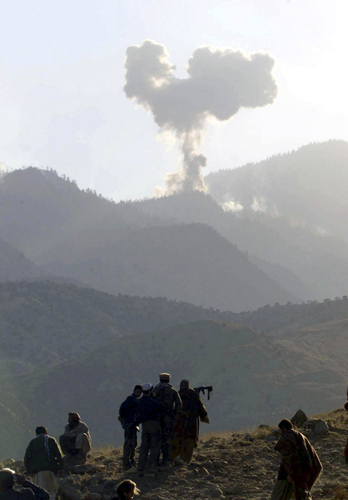Global General
Factbox: 9/11 mastermind Osama bin Laden
(Agencies)
Updated: 2011-05-02 16:32
 |
Large Medium Small |
 |
|
Smoke from US bombing is seen at a command post in the Tora Bora mountains, in this file picture taken Dec 15, 2001. [Photo/Agencies] |
Escape from Tora Bora
Al-Qaida was badly weakened, with many fighters killed or captured. Bin Laden vanished - some reports say US bombs narrowly missed him in late 2001 as he and his forces slipped out of Afghanistan's Tora Bora mountains and into Pakistan.
But the start of the Iraq war in 2003 produced a fresh surge of recruits for al-Qaida due to opposition to the US invasion within Muslim communities around the world, analysts say.
Apparently protected by the Afghan Taliban in their northwest Pakistani strongholds, bin Laden also built ties to an array of south Asian militant groups and backed a bloody revolt by the Pakistani Taliban against the Islamabad government.
Amid a reinvigorated al-Qaida propaganda push, operatives or sympathisers were blamed for attacks from Indonesia and Pakistan to Iraq, Turkey, Egypt, Kenya, Morocco, Algeria, Mauritania, Tunisia, Saudi Arabia, Yemen, Spain, Britain and Somalia.
Tougher security in the West and killings of middle-rank Qaeda men helped weaken the group, and some followers noted critically that the last successful al-Qaida-linked strike in a Western country was the 2005 London bombings that killed 52.
But Western worries about radicalisation grew following a string of incidents involving US-based radicals in 2009-10 including an attempt to bomb New York's Times Square.
In a 2006 audio message, bin Laden alluded to the US hunt for him and stated his determination to avoid capture: "I swear not to die but a free man."
| 分享按鈕 |